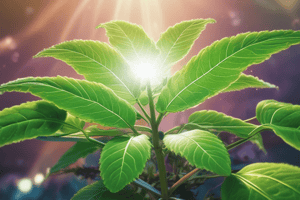Podcast
Questions and Answers
Which electron carrier in the electron transport system acts as the first in the pathway?
Which electron carrier in the electron transport system acts as the first in the pathway?
- Pheophytin (Ph) (correct)
- Plastocyanin (PC)
- Plastoquinone (PQ)
- Cytochrome (Cyt)
Which of the following components is primarily responsible for ATP generation in the electron transport chain?
Which of the following components is primarily responsible for ATP generation in the electron transport chain?
- Ferredoxin (Fd)
- Cytochrome (Cyt) (correct)
- Plastocyanin (PC)
- Flavin Adenine Dinucleotide (FAD)
What is the role of Ferredoxin (Fd) in the electron transport system?
What is the role of Ferredoxin (Fd) in the electron transport system?
- Converts NAD+ to NADH
- Generates ATP through phosphorylation
- Acts as the first electron carrier
- Facilitates electron transfer and affects oxidation states (correct)
What is the relationship between NAD and its two forms?
What is the relationship between NAD and its two forms?
Which component of NAD serves as the base structure that connects its two nucleotides?
Which component of NAD serves as the base structure that connects its two nucleotides?
What is the primary function of Photosystem I?
What is the primary function of Photosystem I?
Which pigment is dominant in Photosystem II compared to Photosystem I?
Which pigment is dominant in Photosystem II compared to Photosystem I?
Where is Photosystem I located within the chloroplasts?
Where is Photosystem I located within the chloroplasts?
Which type of photophosphorylation is associated with Photosystem I?
Which type of photophosphorylation is associated with Photosystem I?
What is the reaction center of Photosystem II known as?
What is the reaction center of Photosystem II known as?
Which process is Photosystem II involved in?
Which process is Photosystem II involved in?
Which of the following statements is true regarding the composition of Photosystem I?
Which of the following statements is true regarding the composition of Photosystem I?
What distinguishes the NADP reduction process between Photosystem I and II?
What distinguishes the NADP reduction process between Photosystem I and II?
Study Notes
Photosystems
- Chlorophyll, a major photosynthetic pigment, is embedded in thylakoid membranes of chloroplasts.
- Chlorophyll-a is responsible for absorbing 680 nanometer wavelengths of light.
- Chlorophyll-a P700 absorbs 700 nanometer wavelengths of light.
- Chlorophyll and electron acceptors are organized into units called photosystems, within the thylakoid membrane.
- Photosystems are the sites of photosynthesis.
- Each photosystem contains a reaction center with various pigments and a primary electron receptor.
- Two types of photosystems, PS I and PS II, are connected by an electron transport chain.
Photosystem I (PS I)
- Located on the outer surface of the grana thylakoid membrane.
- Contains chlorophyll-a 700 (P700), chlorophyll-a 673, and carotenoids.
- Its reaction center is P700.
- Involved in cyclic photophosphorylation.
- Not involved in photolysis.
- Contains a higher concentration of chlorophyll a compared to chlorophyll b.
- Releases electrons during NADP reduction.
- Function: synthesize ATP and NADPH.
Photosystem II (PS II)
- Located on the inner surface of the grana thylakoid membrane.
- Contains chlorophyll-a 680 (P680), chlorophyll-a 670, carotenoids, chlorophyll b, and xanthophylls.
- Its reaction center is P680.
- Involved in noncyclic photophosphorylation.
- Involved in the photolysis of water.
- Contains a higher concentration of chlorophyll b compared to chlorophyll a.
- Releases protons during NADP reduction.
- Function: hydrolyze water and synthesize ATP.
### Accessory Components of Photosynthesis
- Electron transport system (ETS)
- Consists of electron carriers arranged linearly in the thylakoid membrane of chloroplasts.
- Carriers include pheophytin, plastoquinone, cytochrome, plastocyanin, ferredoxin, and flavin adenine dinucleotide (FAD).
- Nicotinamide Adenine Dinucleotide (NAD)
- A coenzyme composed of two nucleotides connected by phosphate groups.
- Exists in oxidized (NAD+) and reduced (NADH) forms.
Studying That Suits You
Use AI to generate personalized quizzes and flashcards to suit your learning preferences.
Description
Explore the essential role of photosystems in photosynthesis, focusing on the structure and function of Photosystem I and II. Learn about the pigments involved, the differences between the two types of photosystems, and their connection through the electron transport chain. This quiz delves into the specifics of chlorophyll and the reactions that drive the process of energy conversion in plants.




